Federal Requirement 4.4
Program Length
Program length is appropriate for each of the institution’s educational programs.
Judgment of Compliance: Compliance
Narrative/Justification for Judgment of Compliance:
Executive Summary
St. Petersburg College is in compliance with this requirement because its program length is appropriate for each of the institution’s educational programs. The College adheres to criteria established through specific guidelines and governing entities to determine the length of its academic programs. SPC’s AS degrees and certificate programs conform to State Frameworks, which are maintained and published by the Florida Department of Education. Associate in Arts and baccalaureate programs (BAS/BS/post-baccalaureate certificates) conform to program length requirements established in state statute and Florida’s state-wide articulation agreement. Advisory committee recommendations or industry-specific accreditation requirements sometimes result in increased program length beyond these standard guidelines.
Guidelines that Determine Program Length
St. Petersburg College (SPC) uses regulatory guidelines - SACS-COC Principles of Accreditation Core Requirement 2.7.1; Florida Statute 1007.25; and State Board of Education Rule 6A-10.024 - to determine the appropriateness of program length and also assure alignment with the Florida Department of Education Curriculum Frameworks.
First and foremost, SPC complies with program length guidelines as established in Southern Association of Colleges and Schools Commission on Colleges' Principles of Accreditation (CR 2.7.1, p. 18) :
"The institution offers one or more degree programs based on at least 60 semester credit hours or the equivalent at the associate level; at least 120 semester credit hours or the equivalent at the baccalaureate level; or at least 30 semester credit hours or the equivalent at the post-baccalaureate, graduate, or professional level…The institution also provides a justification for all degrees that include fewer than the required number of semester credit hours or its equivalent unit."
SPC offers associate degrees (AA/AS), bachelor degrees (BAS/BS), and certificates, including technical certificates, advanced certificates, applied technology certificates, and post-baccalaureate certificates that meet, or in some cases, exceed, the total program length standard for each type of degree. Florida Statute (FS) provides further guidelines on how programs are designed, including the total number of semester hours required for each type:
- "An associate in arts degree shall require no more than 60 semester hours of college credit, including 36 semester hours of general education coursework. Except for college-preparatory coursework required pursuant to s. 1008.30, all required coursework shall count toward the associate in arts degree or the baccalaureate degree." (FS 1007.25 (7))
- "A baccalaureate degree program shall require no more than 120 semester hours of college credit, including 36 semester hours of general education coursework, unless prior approval has been granted by the Board of Governors for baccalaureate degree programs offered by state universities and by the State Board of Education for baccalaureate degree programs offered by Florida College System institutions." (FS 1007.25 (8))
- Program length for AS degrees and certificates adhere to the Florida Department of Education Curriculum Frameworks, which serve as guidelines for aligning program competencies to the Career Clusters delineated by the U.S. Department of Education. Florida Statute 1004.02 defines the types of technical programs offered through St. Petersburg College, but the number of program hours required vary according to the specific technical and or occupational area.
As part of the Florida College System (FCS), academic programs at SPC are further defined by State Board of Education Rule 6A-10.024 and 6A-14.095 to ensure articulation of its programs between and among other colleges in the FCS and institutions in the State University System (SUS):
6A-10.024
- (4)(a): "The associate in arts degree shall be awarded upon: Completion of sixty (60) semester hours of college credit courses in an established program of study, exclusive of courses not accepted in the state university system, and including a general education core curriculum of thirty-six (36) semester hours of college credit in communication, mathematics, social sciences, humanities, and natural sciences with the remaining twenty-four (24) semester hours consisting of appropriate common program prerequisite courses and electives."
- (5)(a): "The associate in science degree shall be awarded upon:… satisfactory completion of a planned program of study comprised of the standard credit hour length established, including demonstration of the attainment of predetermined and specified performance requirements (6A-14.030(2), F.A.C.)…completion of a minimum of fifteen semester hours in the general education core curriculum in the subject areas of communication, mathematics, social sciences, humanities, and natural sciences which meet the Southern Association of College and Schools Commission on Colleges criteria."
6A-14.095
- (5): "The program curriculum, including course numbers and titles, credit hours and established or proposed common course prerequisites demonstrating comprehensive academic content and adherence to general education courses, common prerequisites and other degree requirements as outlined in Section 1007.25, F.S."
Program Length Requirements for All Active Programs at SPC
The following table lists all active programs, including associate degrees (AA/AS), bachelor degrees (BS/BAS), and certificates at St. Petersburg College effective Spring 2013. For the programs that exceed the required minimum number of semester hours, an explanation is listed alongside the entry. No programs at St. Petersburg College contain fewer credit hours required by the Principles of Accreditation, and program length is the same for all programs, regardless of learning modality (e.g., online, face-to-face, modmester, etc.)
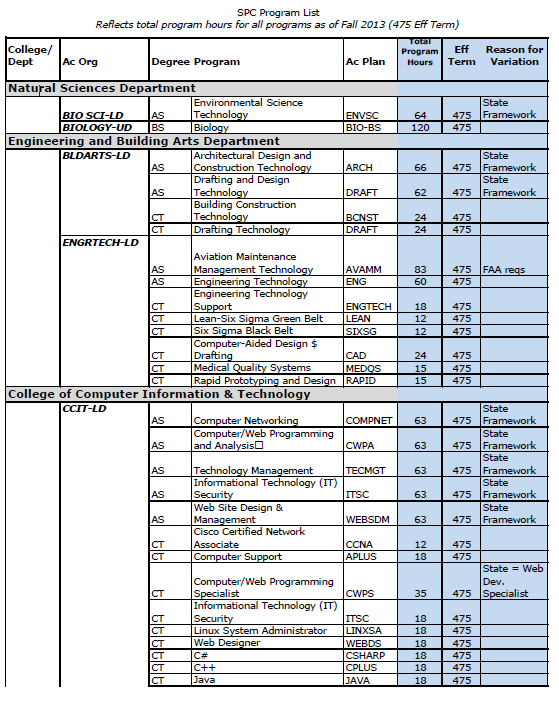

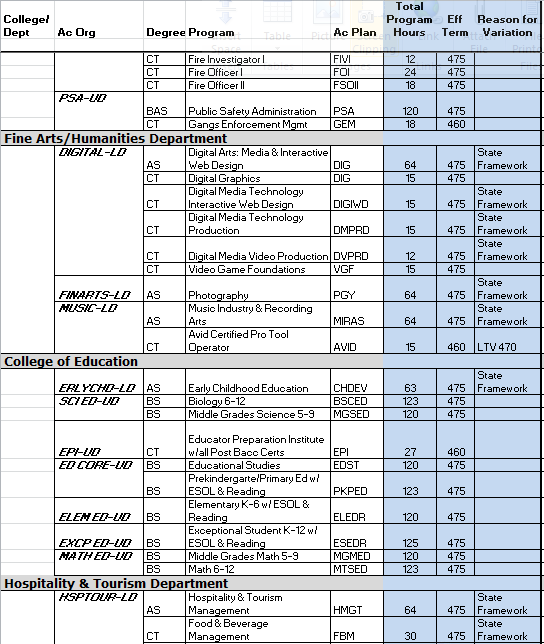
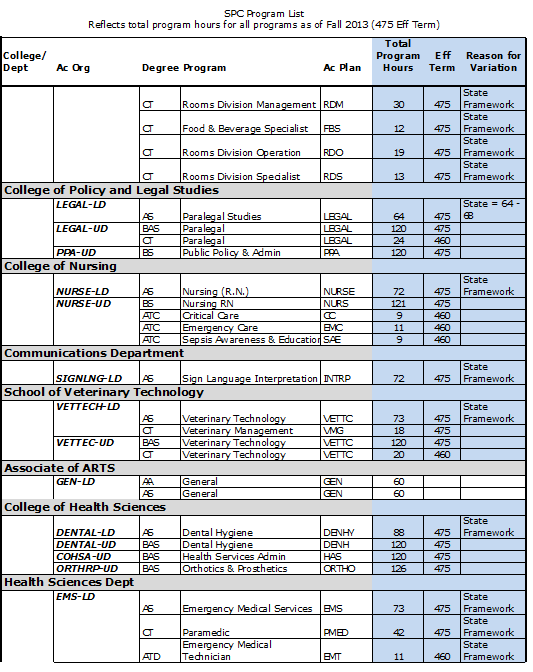
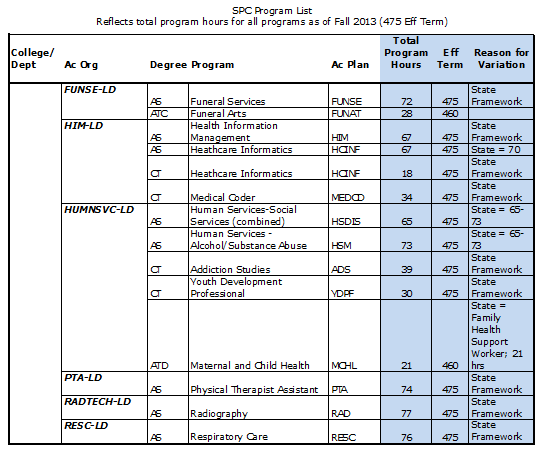
Other Factors that Influence Program Length
In addition to the guidelines referenced above, several other factors ensure the adherence to Principles of Accreditation with regard to program length:
Faculty
St. Petersburg College faculty regularly review industry trends, occupational forecasts, and discipline-specific accreditation standards against their curriculum. This process, which is completed as part of the institution’s annual advisory committee meetings, enables the faculty to modify courses and programs as needed to ensure that programs remain relevant to the surrounding community and business needs. Part of the curriculum review process includes reviewing program length to ensure that submitted changes do not alter total program length, unless documented evidence for the need accompanies the curriculum proposal.
Faculty drive the development of curriculum, both at the program and course level. Faculty perform a "checks and balance" role in ensuring that all programs adhere to standards. If a program is modified - for example, a course is added - faculty within the specific discipline determine how the overall program will be adjusted to accommodate this change. For example, in 2011, faculty in the Health Sciences Administration BAS program determined that entering students needed to better develop their technical writing and research skills early in the program. Initially, the team discussed the idea of adding a one-credit course to the program but knew that they would have to give up a credit hour in another course to accommodate the change and still maintain the total program hours requirement. After a thorough review of data (e.g., Student Surveys of Instruction; course syllabi; adjunct feedback), the group decided to rewrite its introduction course and changed the content to better emphasize these skills. The Curriculum and Instruction Committee, comprised of faculty, reviewed the course modification and its accompanying rational and based its decision to approve the change because of the anticipated impact it would have on student success. Again, no modification of program hours was needed in this example, but it illustrates how faculty truly drive the curriculum development, modification, and approval process at St. Petersburg College before they are sent for final approval through the various College governance committees (see FR 4.2).
SPC Advisory Committees
The institution retains active advisory committees, which play an important role in maintaining and expanding the programs of the College and ensuring that SPC’s program offerings meet the professional and employment needs of the community. A key responsibility of the advisory committees is to, “review its education program on a regular basis (and) suggest changes in a program by viewing its curriculum, equipment, facilities and graduate performance.” The committee makes recommendations based on, “review(ing) the program’s curriculum including course goals, objectives and their interrelationships to determine that what is being presented to students in the classroom and laboratory meets state and local training, knowledge, and skill requirements.” (source: St. Petersburg College Advisory Committee Manual, 2011) Whenever feasible, advisory committees review actual curriculum changes prior to implementation, but this activity serves more as an “update” by program administrators to the committee, as their recommendations are often what prompted the modifications. Program length has not been changed as a result of an advisory committee recommendation.
The following excerpt from a Public Policy Advisory Committee meeting (held on April 16, 2012) illustrates the nature of curriculum discussions held at such meetings and how advisory committees impact program content (but not program length):
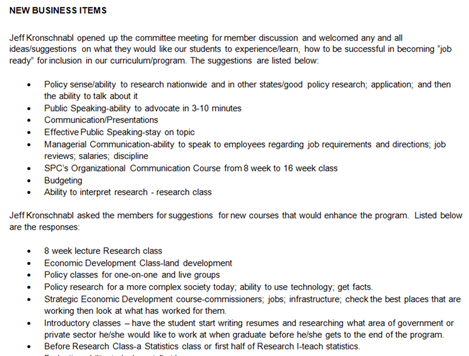
Industry-Specific Accrediting Institutions
State frameworks
and industry-specific accrediting
institutions guide important aspects of SPC’s academic
offerings, including identification of program outcomes, major course
learning outcomes, intended roles of SPC graduates, assessment
measures, and in some cases, expanded program lengths. For example,
SPC’s Dental
Hygiene AS program exceeds the maximum number of 60 semester
hours (currently requires 88 semester hours), due to specific
requirements of the program’s accrediting body (American Dental
Association: Commission on Dental Accreditation) and state licensing
requirements. These necessary changes are approved at the state-level
for all Florida State Colleges and put into the state program
requirements.
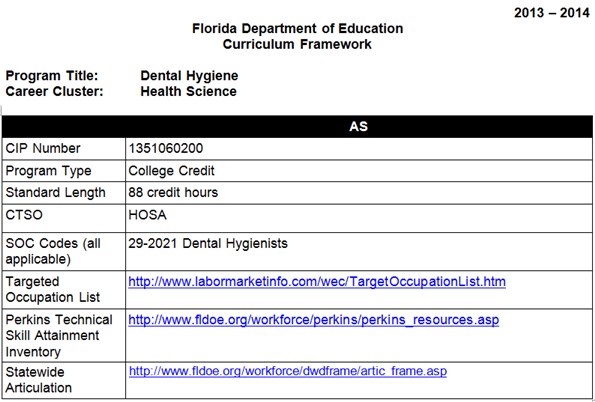
At the baccalaureate level, SPC’s Orthotics and Prosthetics BAS program exceeds the maximum number of 120 semester hours (currently requires 129 semester hours), due to specific standards identified by the National Commission on Orthotic and Prosthetic Education (NCOPE). NCOPE requires that, “programs that wish to offer and prepare students for the orthotist and prosthetist levels must demonstrate that the curriculum meets or exceeds the content of (the 2010) edition of the Core Curriculum for Orthotists and Prosthetists”. SPC's Orthotics and Prosthetics BAS program aligns directly to these standards.
Summary
St. Petersburg College (SPC) complies with the Principles of Accreditation with regard to program length by ensuring that institutional policies and practices adhere to SACS-COC and State guidelines. All of SPC's active programs meet the stated program length requirements. When there are exceptions to requirements (i.e., the Dental Hygiene AS degree), excess hours are justified by either industry-specific accreditation requirements and/or state licensing requirements, and approved by the state Board of Education. Additional factors, such as faculty input and advisory committee reviews, ensure that programs are designed to meet community and employer needs, but do not impact the total program hours. Finally, all programs, regardless of modality, adhere to the same learning outcomes and expectations, and do not vary in total program length.
Supporting Documentation
In order to preserve the integrity of the supporting documentation in case of updates occurring between the submission of this document and the review, the narrative above links to pdf versions, whereas live links are included below.
- Florida Department of Education Curriculum Frameworks
- SACS-COC Principles of Accreditation
- Florida Statute 1007.25
- Florida Statute 1004.02
- State Board of Education Rule 6A-10.024
- State Board of Education Rule 6A-14.095
- Federal Requirement 4.2 Program Curriculum
- Advisory committees
- Advisory Committee Manual, 2011
- Industry-Specific Accrediting Institutions
- Dental Hygiene AS Program
- Orthotics and Prosthetics BAS Program
- NCOPE Core Curriculum for Orthotists and Prosthetists
